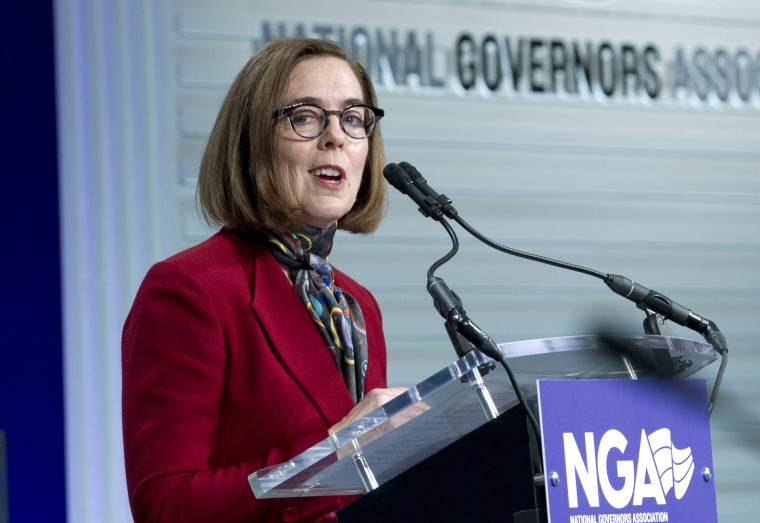SALEM, Ore. — Republican senators in Oregon engaged in a high-stakes game of brinksmanship Friday with Democratic lawmakers and prepared to remain absent from the Capitol for a second day to block a vote on a landmark climate plan that would be the second of its kind nationwide.
Oregon Gov. Kate Brown deployed the state police Thursday to try to round up 12 Republican senators who fled the Legislature — and in some cases, the state — to thwart the passage of a cap-and-trade proposal that would dramatically lower greenhouse gas emissions by 2050. The minority GOP caucus wants the plan to be sent to voters instead of being instituted by lawmakers — but negotiations with Democrats collapsed, leading to the headline-grabbing walkout.
"It's time for the Senate Republicans to show up and do the job they were elected to do," Brown, a Democrat, said at a news conference as GOP lawmakers showed no signs of returning.
State Police can force any senators they track down in Oregon into a patrol car to return them to the Capitol, although the agency said in a statement that it would use "polite communication" and patience to bring the rogue lawmakers back.
Under state law, the rogue senators will be fined $500 a day per person starting Friday if enough of them remain absent to prevent a vote. Democrats have an 18 to 12 majority in the chamber, but need 20 members present for a quorum.
The state police don't have jurisdiction outside Oregon and it was unclear what troopers were doing to find the lawmakers and get them to return.
This is the second time in this legislative session that minority GOP lawmakers have used a walkout as a way to slow the process. Democrats have a rare supermajority in the House and Senate, meaning Republicans don't have many ways to influence the debate.
Republicans walked out of the Senate last month to block a school funding tax package. The standoff lasted four days, until the governor struck a deal to table legislation on gun control and vaccine requirements.
The tactic is rare, but it has been used throughout history. Abraham Lincoln once leapt out of a window in an attempt to deny a quorum when he was a lawmaker in Illinois.
In 2003, Texas Democrats fled to neighboring Oklahoma to deny a quorum, holing up in a Holiday Inn to block a GOP redistricting bill. The Democrats returned to Texas after the bill's deadline passed, and it was effectively killed.
On Thursday, Oregon's Senate president pleaded with Republicans to return.
"I beg and beseech my fellow legislators to come to the floor. I need you, the Legislature needs you, the people of Oregon need you to pass budgets to take care of our citizens," Senate President Peter Courtney said on the Senate floor.
Under the proposed cap-and-trade bill, Oregon would put an overall limit on greenhouse gas emissions and auction off pollution "allowances" for each ton of carbon industries plan to emit. The legislation would lower that cap over time to encourage businesses to move away from fossil fuels: The state would reduce emissions to 45% below 1990 levels by 2035, and 80% below 1990 levels by 2050.
Those opposed to the cap-and-trade plan say it would exacerbate a growing divide between the liberal, urban parts of the state and the rural areas. The plan would increase the cost of fuel, damaging small business, truckers and the logging industry, they say.
Democrats say the measure is an efficient way to lower emissions while investing in low-income and rural communities' ability to adapt to climate change. It has the support of environmental groups, farmworkers and some trade unions.
The proposal also contains a $10 million investment to protect workers adversely affected by climate change policy.
California has had for a decade an economy-wide cap and trade policy like the one Oregon is considering. Nine northeastern states have more limited cap-and-trade programs that target only the power sector.
